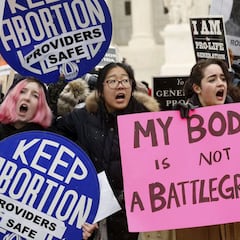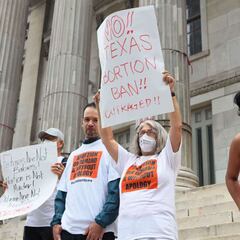Which companies donated to the Texas abortion law?
Companies come under after information is released which shows many donated to leaders that championed Texas' controversial abortion law passed this fall.

In September, the Supreme Court refused to rule over one of the most draconian abortion laws passed by a state since the Roe v. Wade decision in 1973. In early October, after going into effect the law was suspended after a federal judge blocked its implementation. This action means that the Supreme Court will have to provide a decision on the constitutionality of the abortion law, which is expected in December.
What are the details of the law?
The Texas law banned abortion after six weeks, at which point many women still do not know that they are pregnant. The law also allows for citizens to bring forward civil cases with a reward of $10,000 against the person receiving the abortion, the healthcare professionals, or anyone who aided in the process. Lawmakers also did not create an exception for cases of rape or incest.
Donations from major businesses made the law possible
The leaders who championed the law, which could be replicated across the US, received major campaign donations from many corporations. Many of these big businesses, regularly profess their support for women's rights on social media and the hypocrisy did not go unnoticed.
Which companies donated to leaders?
- AT&T: $301,000
- Comcast/NBCUniversal - $58,250
- CVS Health - $72,500
- UnitedHealth Group - $90,000
- Anthem - $87,250
- Charter Communications - $313,000
- USAA - $152,000
- Farmers Insurance - $120,000
- General Motors - $72,750
Their financial support over the years has been documented by Popular Information, a newsletter that regularly exposes company funding practices has listed huge companies in America that have funded groups that support the law.
At Anthem, we honor International Women’s Day, and continue to empower women within our own organization and in the communities we serve. But there’s still more to be done. Our CEO Gail Boudreaux reflects on this year’s theme: #ChooseToChallenge https://t.co/Vkp1I57dSy
— Anthem, Inc. (@AnthemInc) March 8, 2021
In addition to those that have given large sums of money, activists have called on corporations who have remained silent, saying that they should use their platform to protect women's rights.
What businesses have been against the law?
Businesses in the past have influenced debates surrounding abortion, such as in Alabama in 2019 where 200 CEOs denounced the abortion laws there. But if the financial impact is not significant enough, the businesses are likely to play along.
Two ride-sharing services, Lyft and Uber announced in September that they would take action against the new law.
Lyft announced that it would donate $1 million to Planned Parenthood.
This is an attack on women’s access to healthcare and on their right to choose. @Lyft is donating $1 million to Planned Parenthood to ensure that transportation is never a barrier to healthcare access. We encourage other companies to join us.
— Logan Green (@logangreen) September 3, 2021
Many people believe that Planned Parenthood is primarily an abortion provided -- this is categorically false. Abortions represent 3.5 percent of the services provided. For many people, Planned Parenthood is the only place they get access to affordable cancer screenings and sexual health services.
Both companies, Lyft and Uber, will be starting a legal fund to cover drivers who may be sued for driving a patient to an abortion clinic. This shows how expansive the law is, given that even a cab driver could be fined for simply driving to a clinic where abortions are performed.
Bumble, the dating app, sent a memo to employees after the Supreme Court's ruling saying: “The company generally does not take political stands unless it is relevant to our business,” CEO Shar Dubey said in the memo, “But in this instance, I personally, as a woman in Texas, could not keep silent.”
Additionally, in late September, more than fifty companies signed a letter calling voicing their opposition. The letter said that the signatories believed that this law and policies "that restrict reproductive health care go against our values and are bad for business." The companies said that these policies limit their "ability to build diverse and inclusive workforce pipelines, recruit top talent across states, and protect the well-being of all the people who keep our businesses thriving day in and out." Some of the signers include Ben and Jerry's, Patagonia, Stichfix, Madewell, and many more.
Why have companies been silent?
Forbes reported, that both Microsoft and Starbucks refused to sign the letter.
Factoring into this, Texas has made a concerted effort in recent years to attract big business. Tesla has recently moved to the state from California, while Apple has recently built a new campus in Austin.
In addition to the abortion law, the Texas legislature also passed a restrictive voting law which companies were more willing to address. For example, American Airlines told the New York Times’s DealBook the company had “hoped for a different outcome” and wanted legislation “making it easier to vote, not harder.”
Related stories
Making voting easier is a pretty harmless issue to support as a private company. But it is becoming clear that some corporations see the possibility of speaking out to protect safe access to legal abortion as something that could threaten their bottom line.
Money talks, and as long as there isn't significant enough pressure on companies that will hurt their profits, then it is unlikely that enough pressure on the Texas government is exerted to force them to change course.

